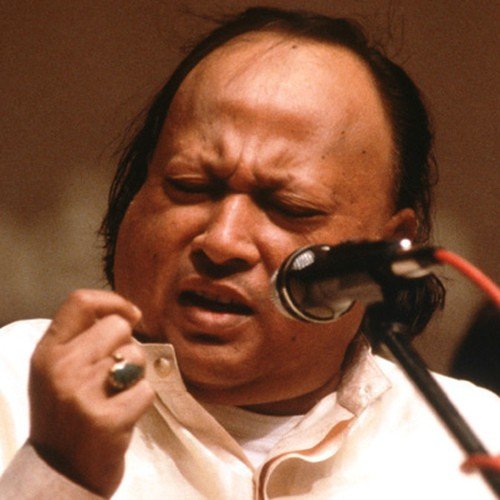
Nusrat Fateh Ali Khan
Artist · 1,616,168 Listeners
Some content courtesy of Wikipedia.
Born
October 13, 1948
Introduction
Blessed with an extraordinary range of vocal abilities, the late Nusrat Fateh Ali Khan did an exemplary job of extending the 600-year-old Qawwali tradition of his family by popularizing this form of music worldwide. Small wonder then, that he is often called the Shahenshah of Qawwali. His mystical Sufi style of music continues to hold all listeners spellbound.
Early Life
Nusrat Fateh Ali Khan was born into a renowned Qawwal family, which had been performing Qawwalis for six hundred years. His father Ustad Fateh Ali Khan and uncle Mubarak Ali Khan were both respected Qawwals. Nusrat’s father wanted Nusrat to have a respectable career as a doctor. However, Nusrat always had a penchant for Qawwalis since an early age. Soon his father taught him to sing Qawwalis within the classical framework of Khayal. His father expired in 1964, so Nusrat’s uncle continued to train him. Nusrat’s first performance was at his father’s funeral ceremony. Soon after, he became leader of his family Qawwal group. In March 1965, Nusrat performed his first studio broadcast on Pakistan Radio as part of annual music festival called Jashn-e Baharan. Nusrat’s first major hit in Pakistan was the song Haq Ali Ali. In 1979, he accepted an invitation to perform at the wedding of Bollywood actor Rishi Kapoor, which all the stars of Bollywood of that era attended.
His Marriage
In 1979, Khan married his first cousin, Naheed and they have one daughter, Nida.
Rise to fame
The summers of 1985 were the time, when Nusrat attained international recognition. He performed at World of Music Arts and Dance (WOMAD) Festival in London and won huge acclaim. He then teamed up with Peter Gabriel for working on the soundtrack of The Last Temptation of Christ. In the same year, he visited Japan at the invitation of the Japan Foundation. He revisited Japan in 1988, to perform at the 5th Asian Traditional Performing Art Festival. Soon after, he gave a lively performance at the Brooklyn Academy of Music in New York in 1989, which earned him fame from an American audience. By 1990, he had worked with Canadian musician Michael Brook on the Album Mustt Mustt, which gave him the chance to fuse Qawwali with Western music. In between 1992-93, he was a visiting artist in the Ethnomusicology department at the University of Washington, USA.
In 1995, Nusrat collaborated with lead singer Eddie Vader of Pearl Jam fame to record two songs for the soundtrack of the Hollywood movie Dead Man Walking. Later, Peter Gabriel released five of Nusrat’s albums including Mustt Mustt and Star Rise. Nusrat had already provided vocals for the Prayer Circle, but died before it was completed. Alanis Morissette had to complete his unfinished vocals. Later, in 1997 two albums Intoxicated Spirit and Night Song were nominated for Best Traditional Folk Album and Best World Music Album respectively.
Shortly before his demise, he recorded for 2 Bollywood movies, Koi Jaane Koi Na Jaane for Aur Pyaar Ho Gaya (he also sang this number onscreen) with Udit Narayan and Is Shaan-e-Karam ka kya kehna for Kachche Dhaage. His next Bollywood film number was Saya Bhi Saath Jab Chhod Jaye for the film Dillagi, which released in 1999, two years after Nusrat died.
Nusrat also sang ‘Gurus of Peace’ for the AR Rahman composed album Vande Mataram, celebrating the 50th Year of India’s Independence. As a tribute to Nusrat, Rahman included the number Allah Hoo in the album entitled Gurus of Peace. Later, Rahman also composed the song Tere Bina as an honour to Nusrat.
His Demise
In August 1997, while Nusrat was in London, England, he suffered from kidney and liver failure and was being shifted to a hospital in Los Angeles, USA for a kidney transplant. However, he died in Cromwell Hospital, London on August 16, 1997 due to a cardiac arrest. His wife, passed away in 2013 leaving behind their daughter Nida.
Documentaries
• Nusrat Fateh Ali Khan: le dernier prophète (1996). Directed by Jérôme de Missolz.
• Nusrat has Left the Building... But When? (1997). Directed by Farjad Nabi. (This 20-minute docudrama focuses on Khan's early career.)
• A Voice from Heaven (1999). Directed by Giuseppe Asaro. New York, NY: Winstar TV & Video. (This 75-minute documentary, available on VHS and DVD, provides an introduction to Khan's life and work.)
• Samandar Main Samandar (2007). A documentary aired on Geo TV detailing Khan's career.
• The King of Qawalli (2009). A short film aired on Dawn News about Khan's life and career.
Awards
With a musical career spanning quarter of a century, Nusrat was awarded with the honorary title of Ustad after a concert commemorating his father’s death anniversary.
President of Pakistan’s Award for Pride of Performance (1987)
UNESCO Music Prize (1995)
Grand Prix des Amériques at Montreal World Film Festival (1996)
Arts and Culture Prize of the Fukuoka Asian Culture Prizes (1996)
The "Legends" award at the UK Asian Music Awards (2005)